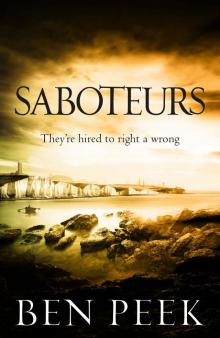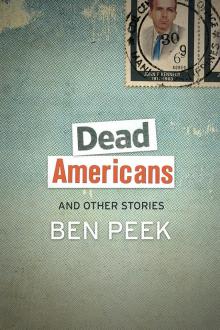Dead Americans Read online
Page 3
With smiles, offers of food, drink, all of which he turned down, Emily Parson told him what he had heard already about Amanda: about the obsession, about the want, and about her complete inability in relation to music and the way that surprised her the first time. She had even seen the set in Jacob’s, which, at this stage in her relationship with Amanda, was no surprise. Still, when she spoke of the dead girl, she did so fondly—“like she was a kid who didn’t know any better”—even if she knew nothing to tell him that would relate to her murder and the fire in the mosque.
Strangely, however, she did not speak of Sarah until he bought it up.
“Sarah?”
“Yeah,” Williams said. “Her sister.”
“Her twin, right.” Emily Parson shrugged, looked a little embarrassed. “I forgot. But I’m going to have to apologize, Sheriff, because I just don’t remember her at school. It was a shock to see her there; the whole time I just drew a blank, and I still do. So did all my friends. None of us could remember her from the school: it was as if she just appeared after we’d finished.”
And They Were in a Band He Didn’t Like
It got strange, afterward.
With Emily Parson’s words lingering in his mind, Williams returned to his sparse, brightly lit office and began making phone calls. At Red Grove High, it was only Amanda who was remembered by the sad-voiced principal, Audrey Davids, and only Amanda who appeared in the files. It was an unremarkable file, lacking definition in studies and delinquency. In a year of sixty-seven, it was fair to say that Amanda Currie had been a ghost, forced to wait until after High School for colour and weight to be added to her so that she could be real. But at least she was a ghost: that trail of paper work was more that her sister had.
“If you could just walk through the door, Sarah,” Williams muttered, dropping the phone into its cradle after the call, “just right through my door, that’d be real helpful.”
Before Red Grove, Williams discovered as he picked his way like a vulture through the files he’d printed out, the Currie family had lived in Yermo. The father—Martin—hard worked on the military site there. Calls to the local High and Junior High Schools in Yermo did not find anyone who could remember Sarah, or find a listing for her on the roll, just as it had been for Red Grove, and when he called the military base, a sweet-sounding white girl told him that Sergeant Martin Currie, deceased for reasons she could not disclose, had one daughter, one wife.
“Through the door. Just right through the door. Come in and sit down. I’ll give you a drink.”
After that last frustrating call, Williams saluted the door with his plastic cup, refilled twice, and then picked up the photograph of Amanda and Sarah. It was evidence of a very tangible kind of her existence but, it appeared, he was one of the few people with it. Maybe she was a secret, then? An angry little secret kept hidden. That would go some way to explaining it: Sarah could have lived with an aunt—Helen had a sister, Martin a brother and sister—and, once the thought appeared, it bloomed inside his mind, growing so big and bright that all other avenues of thought were obscured by it. “Some mystery solver you are, just making this shit up,” he murmured as he dialed Helen Currie’s number, and waited while it rang.
“Hello?”
It was a man’s voice, deep, but familiar.
“Yeah, hi. This is Sheriff Pete Williams. I’m wondering if I could speak to Helen?”
“I’m sorry, Sheriff, but she’s asleep. I’d rather not wake her—it’s been hard, y’know?”
He sympathized, but still couldn’t pick the voice. “That’s fine. Who am I speaking with?”
“Robert Hicks.”
A big, fatty man, caught twice for speeding, once for drunk driving. “Hi, Rob. Think you might help me? I’m trying to track down who Sarah lived with before coming to Red Grove?”
“She lived in Yermo with Helen.”
“Didn’t live with aunt or nothing?”
“Kinda grief she gives, I wish she had, but no.”
After the phone clicked, a solitary piece of punctuation to end his theory, Williams picked up the photo again.
“Fuck me,” he said, finally, and tossed it across the room with a defeated flick.
He left it in the corner, a coloured, useless memory, and left the office to head home. The day was just about done, anyhow, but mostly he just couldn’t handle another moment sitting in that chair, calling people, hearing them tell him they didn’t know Sarah, and feeling his frustration grow. It was enough to make a man with a borderline drinking problem think he’d pushed himself across that line. Still, when he climbed into his sun-warmed truck and found the Dried Flowers album still on the passenger seat, he couldn’t resist opening it, just to double check that Sarah was still on the inside. She was, of course, and that frustrated him more. Maybe this frustration was what detectives in fiction felt? He’d never been a big reader, but the thought, now there, left him feeling as if he’d missed a way to solve his problem. He even had books that he could consult, bought by his wife before they left for L.A., and still unread. Their library, despite best intentions, had been a pristine one, and she had left it with him when she took his son and her new clothes, and he thought—“It isn’t going to help, idiot”—that they might provide a way for him to find his answer.
It was desperation, nothing more, he knew. Chances were that in the morning he would be back to wishing that Sarah would simply walk into his office off the street, which was worse than looking through detective novels for answers. In truth, he knew what he should do, which was to call the county’s office, tell them what happened, and have them send someone who had dealt with this kind of thing before. He wouldn’t, though. He couldn’t. Not yet. The two girls had dug under his impersonality, his purposeful deadening of emotions in relation to his job and, as he drove through the darkened Bale Street on which he lived, he knew that he would not be able to let it go. In fact—
He stopped.
Literally.
He jammed his foot on the brake and jerked his truck to stop half way up his driveway.
There, in front of his squat, tin roofed, dark house, sat Sarah Currie. She was on the cement stairs, a thick backpack next to her, and a series of cigarette butts at her feet. She was wearing brown and orange, earthy colours, and no black; but there was no time to linger over that realization than the quick, subconscious note he made, because as his truck stopped, as the lights illuminated her, she rose to her feet, taller than what he imagined, and with a small, black pistol in her hand. Upon seeing that, there was a moment, just one, where before he turned the engine off, before the lights flicked off, he thought that he should put the truck in reverse. He should stomp on the gas, call Steve, get the gun he left locked in his office and . . . but he didn’t, even though he knew she had killed her sister, even though he knew it possible that she could kill him, he didn’t.
His hard soled shoes hit the gravel. “Sarah Currie,” he said, trying to place as much authority in his voice as he could. “I’ve been looking for you.”
“I know.”
“You want to put down the gun?”
“No.” She sounded controlled, confident, unphased by his tone. “Stay by your truck, too.”
“Okay.” He put his palms out, fingers wide, projecting as little threat as he could. “How did you hear I was looking for you?”
“I heard you.”
“Heard?”
“Yes.” She had yet to raise the gun, but he noted that her feet kept moving, agitated. “It was all I heard today.”
Taking a step forward, Williams said, “Your Mum—”
“She’s not my mother!” Sarah cut him off loudly, her right arm, the arm that held that gun, twitching suddenly, and causing him to tense, to halt his second step. “I could hear you, Sheriff. Hear you in your office, in the street, in your truck, wanting me to come and see you. Pleading with me. Telling me to walk through t
he door, to hand you an answer.”
Unable to say anything else, he said, “This is not my office.”
“No.” She smiled, a queer, disconcerting smile. “I have some choice over what I do now. I have some free will. You’re not—”
“Sarah.”
“Amanda,” she said. “I was going to say Amanda.”
“She’s dead.”
“I know.”
“You.” He paused, then mentally shrugged, took another step forward, and said, “You killed her?”
Sarah’s strange smile evaporated and a frown, a tiny turn of her lips, a sign of genuine regret, emerged in its place. “Not on purpose. She—she wanted to hurt herself so badly. She wanted to punish herself. It was after the gig at Jacob’s, because of that. It was meant to go differently!” She shook her head. “She was so sure of that. She knew it. She believed it. We weren’t meant to be booed off stage. We were supposed to be loved—but when that didn’t happen, she blamed herself. She hadn’t believed enough, she said. It made her so angry.”
“I heard that was you.”
The regret flashed away: the eye in her emotional cyclone. “Yes. I suppose you did.”
He continued forward, slowly. “Why don’t you tell me what’s going on here? Why no one remembers you?”
“No.”
She shot him.
Once, then twice, but not, he thought as he fell, not a third time.
“I don’t need people to tell me what to do,” he heard her say. “I don’t need their thoughts in mine, not now. Without her around, there’s no one to force people to remember me. No one to force me to remember things I never did. To feel things I never felt. Do you know what that’s like? When she was angry, I was angry. When she hated someone, I hated someone. She got to be free of it, but not me, no. No. It was like she really did just make me up one day to be everything she didn’t like about herself.” She was standing above him now, and he looked up, looked at her from where he sat crumpled in the gravel, but could not really see her. His focus was on the blood flowing from his stomach, on the difficulty he had swallowing. But her smile, that queer smile from before, returned to her face as he looked up and it was, even distracted as he was, he was sure that it was the sign of her derangement, of her broken psyche, of the reason why she killed her sister. “No,” her voice was muffled, and it seemed that she was answering him, but he hadn’t spoken, for once, he hadn’t. “That’s not true. She really did make me up, to be what she couldn’t be. So she could make that music that no one liked. That was the crazy part.”
But it Made Him Think of You
When she was gone, he lay there on the gravel, dying.
No one had come to him, but even though he found it difficult to focus, he wasn’t surprised. They should stay inside. They should stay where it was safe. Still, he thought. Still, if one of those people in any of the blurry-lit houses could call an ambulance, that wouldn’t hurt . . . but he did not say it. What did it matter? He wouldn’t die with gritted teeth like Amanda Currie. There was no reason for him to do so—and that, he realized, there, the end of his epiphany, the final part, was why she had dug under his skin. The intensity that everyone had spoke of, her desire to be a musician, it was there, even in death, marking her as something she had lost; but he had no such thing to lose. He had so little, in fact, that he could not even be bothered to crawl painfully to his truck, to radio for the ambulance. By turning his head he could see the outline of the bumper, the dent in the metal from where he’d hit a pole, parking, a little drunk. No, it really didn’t matter. Inside the house was empty. One bed still made. One not. Photos still in their dusty place. He could not grit his teeth if he tried.
But.
But.
But what, he thought dimly, the sound of an ambulance not yet reaching his ears, what if that deranged girl was right, what if, through simple force of belief, you could change the world around you?
What then?
Or So His Letter Said.
The Dreaming City
1895.
In his dreams, he had always been Mark Twain; awake, he had always been Samuel Clemens.
It had been so since the day he had first used the pseudonym. At first, he thought of it as a warning, but the first dreams had been sweet like the Missouri summers of his childhood, before his father’s death. There was a rare quality to them, and he awoke refreshed and invigorated and filled with the kind of joy that not even the most vivid memory of his childhood years could supply; of course, as time continued, not all the dreams of Mark Twain had been so pleasant, but even the nightmares provided him with a substance that nothing in the waking world could provide him.
And now, at sixty, asleep in the White Horse Motel in Sydney, the small, grey haired man no longer felt the slightest sense of warning as he dreamed.
It was natural, normal, as familiar as the shape of his hands. It simply was.
Mark Twain dreamed:
He stood on the wooden, creaking docks of Sydney Harbour. It was early evening, and the sky had been splattered with leaking orange paint, while in front of him was an ocean of closely packed, swaying hulks: rotting old troop transports and men-o-wars, their masts and rigging stripped away, the remaining wooden shells turned into floating prisons that had, one hundred years ago, marred the Thames in a cultural plague.
1788.
The Eora watched the arrival of the First Fleet from the shores of the Harbour, and were told by the Elders that they had nothing to fear from the great ships: they held the spirits of their ancestors, reborn in fragile white skin. In response, the Eora questioned and argued, but the truth, the Elders said, was inescapable.
Look closely, they whispered, and you will recognize the members of your family.
But how? the Eora demanded with one voice. How can this be true?
The Elders never hesitated with their response: They have sailed out of the Spirit World itself.
Introduction to A Walking Tour Through the Dreaming City.
The Harbour has never been a welcoming birth for immigrants. Since the day the English landed and changed its name from Cadi to Sydney Harbour, this has been the case. The cultural wars that have been fought along its banks and throughout Sydney’s streets for over two hundred years have left their mark on the heart of our great beast, and the signpost for this is the Harbour. Yet strangely, the literary acknowledgement of the Harbour’s significance does not begin in the journals of the naval captains who arrived with convicts, or in the diaries of the Irish or Chinese, but in this book you are holding now, Mark Twain’s A Walking Tour Through The Dreaming City:
‘Sydney Harbour is shut behind a precipice that extends some miles like a wall, and exhibits no break to the ignorant stranger. It has a break in the middle, but it makes so little show that even Captain Cook sailed by without seeing it. Near by that break is a false break which resembles it, and which used to make trouble for the mariner at night, in the early days before the place was lighted. Any stranger approaching Sydney is advised to take heed as the entrance is the only warning the city will offer on its nature; that it is filled with false hope and false promise, and that it and its citizens will break anyone dreaming who is not natural to it.’
Twain understood Sydney, in some ways clearer than those who have lived in it, while at the same time being incredibly naïve about certain aspects of it. However, he understood the importance of the Harbour, and it is from here that he launched his dissection of the city, altering it forever. It might appear strange to an Australian that such an important change in Sydney’s history would begin in an American’s book (and published one hundred years after the first Englishman stepped foot on the soil), but after shaping the city and its political climate, historians and academics alike have been forced into recognizing Mark Twain’s legacy for years. The reader only has to walk down George Street, and into the floating mass of American culture that is p
resented in signs tattooing McDonalds, Nike, Subway, Taco Bell, HMV Music, and Borders onto his or her subconscious to understand the very basics of the argument.
The seeds of this gift (or curse, depending on your stance) have now been passed onto you, dear reader, with this new edition. In these pages, you will find the finest chronicle of English occupied Sydney, which began when the first of our chained ancestors stepped onto our shores, and the birth of the new Sydney when the most American of Americans began his tour.
And yet, still, the meaning of the Harbour and Sydney has not changed in all that time. It is as if it is immune, or purposefully resistant to anything that arrives. The result of this, is that time has only crystallized the fact that Sydney has never welcomed immigrants, never welcomed the poor, the hungry, or anyone who is in need, and that this mentality spreads throughout the country from here. It is a sad fact in this new millennium that examples are easy to find: Detention Camps that spring up as barbwire islands in the dusty sea of outback New South Wales, fattened with immigrants who have fled less fortunate countries than ours, are just one example. But then perhaps Twain, for all the change he brought, knew that this part of Sydney’s nature would not change. After all, it was he who wrote that ‘Satan made the deceptive beauty of Sydney’s Harbour, which is available for all to witness on shore.’ It is a sentiment that anyone who has lived in Sydney will find familiar.
1788.
Pemulwy, the scarred, black skinned Eora warrior, climbed into the thick arms of a eucalyptus tree. There, he watched his dead brothers row into the ocean on ugly, unsuitable boats, and fish.

 Saboteurs
Saboteurs The Godless
The Godless Leviathan's Blood
Leviathan's Blood Dead Americans
Dead Americans The Eternal Kingdom (The Children Trilogy Book 3)
The Eternal Kingdom (The Children Trilogy Book 3)